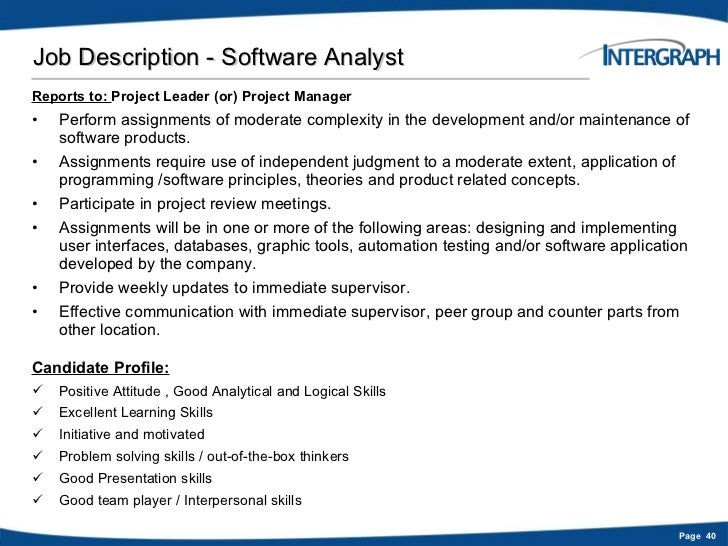In today’s rapidly evolving technological landscape, software analyst jobs are in high demand. These professionals play a crucial role in designing, developing, and maintaining the software systems that drive our modern world. With a comprehensive understanding of software development methodologies and a keen eye for detail, software analysts ensure that software meets user needs, is efficient, and aligns with business objectives.
In this guide, we will delve into the exciting world of software analyst jobs, exploring the essential skills and qualifications, job responsibilities, industry-specific applications, career advancement opportunities, and effective job search strategies. Whether you are a seasoned professional or just starting your career, this guide will provide valuable insights to help you succeed in this dynamic field.
Job Market Overview
The job market for software analysts is experiencing steady growth, driven by the increasing demand for data-driven decision-making and digital transformation across industries.
According to the U.S. Bureau of Labor Statistics, the employment of software analysts is projected to grow 25% from 2021 to 2031, much faster than the average for all occupations.
Industry Growth
The demand for software analysts is particularly high in sectors such as:
- Information technology
- Financial services
- Healthcare
- Retail
- Manufacturing
Employment Rates
As of May 2022, the unemployment rate for software analysts was 1.3%, significantly lower than the national average of 3.6%. This indicates a high level of job security for software analysts.
Salary Expectations
The median annual salary for software analysts in the United States was $100,090 in May 2022. Salaries can vary depending on factors such as experience, location, and industry.
Essential Skills and Qualifications
Software analysts play a crucial role in the development and maintenance of software systems. To excel in this field, a combination of technical expertise and soft skills is essential. This section explores the core skills and qualifications that hiring managers seek in software analyst candidates.
Technical Skills
Software analysts are expected to possess a solid foundation in computer science fundamentals, programming languages, and software development methodologies. Key technical skills include:
- Programming Languages:Proficiency in programming languages such as Java, Python, C++, and SQL is essential for understanding and analyzing software code.
- Data Analysis Tools:Familiarity with data analysis tools like SQL, Hadoop, and Tableau is crucial for extracting insights from large datasets.
- Software Development Methodologies:Knowledge of agile methodologies such as Scrum and Kanban, as well as traditional methodologies like Waterfall, is necessary for efficient project planning and execution.
Soft Skills
Beyond technical expertise, software analysts require strong soft skills to effectively collaborate and deliver successful projects. These include:
- Communication:Excellent written and verbal communication skills are essential for conveying technical information to stakeholders, including business users, developers, and project managers.
- Problem-Solving:The ability to identify, analyze, and resolve complex software issues is crucial for ensuring the quality and functionality of software systems.
- Analytical Thinking:Software analysts must be able to gather and interpret data, identify patterns, and make informed decisions to optimize software solutions.
Certifications and Education
Certifications and educational qualifications can enhance job prospects for software analysts. Relevant certifications include the Certified Software Quality Analyst (CSQA) from the American Society for Quality (ASQ) and the Certified Business Analyst Professional (CBAP) from the International Institute of Business Analysis (IIBA).
Additionally, a bachelor’s or master’s degree in computer science, software engineering, or a related field is highly valued by employers.
Job Responsibilities and Duties
Software analysts play a crucial role in the software development lifecycle, with responsibilities spanning across various phases of a project.
Their primary responsibilities include:
- Requirements Gathering:Software analysts work closely with stakeholders to gather and document functional and non-functional requirements. They analyze and interpret user needs, ensuring a clear understanding of the desired system’s behavior and capabilities.
- System Analysis:Analysts conduct thorough analysis of existing systems and processes to identify areas for improvement and optimization. They evaluate system performance, identify bottlenecks, and recommend solutions to enhance efficiency and functionality.
- Software Testing:Software analysts are involved in various stages of software testing, including unit testing, integration testing, and user acceptance testing. They design and execute test cases to ensure that the software meets requirements, performs as expected, and is free from defects.
Project Planning, Implementation, and Maintenance
Software analysts actively participate in project planning, implementation, and maintenance activities. They work with project managers to define project scope, timelines, and resource allocation. During implementation, analysts provide technical guidance, monitor progress, and resolve any issues that arise.
Post-implementation, analysts are responsible for ongoing maintenance and support. They monitor system performance, analyze user feedback, and recommend enhancements to ensure the software remains aligned with business needs and user expectations.
Quality Assurance and User Acceptance Testing
Software analysts play a key role in ensuring software quality. They work closely with quality assurance teams to establish and implement quality standards. They conduct thorough testing to identify and resolve defects, ensuring the software meets defined quality criteria.
User acceptance testing is a critical phase where analysts involve end-users to evaluate the software’s functionality and usability. They collect feedback, address concerns, and ensure that the software meets the users’ expectations.
Industry-Specific Applications

Software analysts find employment in a wide range of industries, each with its own unique set of software requirements. These industries include finance, healthcare, e-commerce, and many others.
In the finance industry, software analysts play a crucial role in developing and maintaining software systems that support financial transactions, risk management, and compliance. They work closely with financial professionals to understand their business needs and translate them into software requirements.
In healthcare, software analysts help create software solutions that improve patient care, streamline administrative processes, and enhance the efficiency of healthcare delivery. They work with medical professionals to ensure that software systems meet the specific requirements of the healthcare industry.
E-commerce
In the e-commerce industry, software analysts are responsible for developing and maintaining software systems that support online shopping, payment processing, and inventory management. They work closely with e-commerce businesses to understand their business needs and develop software solutions that meet those needs.
Examples of Successful Software Analysis Projects, Software analyst jobs
Numerous successful software analysis projects have been implemented across various industries. One notable example is the development of a fraud detection system for a major financial institution. The software analysts worked closely with the bank’s fraud prevention team to identify patterns of fraudulent activity and develop software that could detect and prevent such activity in real time.
Another example is the development of a patient management system for a large hospital. The software analysts worked closely with the hospital’s medical staff to design a system that would improve patient care and streamline administrative processes. The system has been a great success, reducing wait times for patients and improving the efficiency of the hospital’s operations.
Career Advancement and Growth: Software Analyst Jobs
Software analysts typically advance in their careers by specializing in a particular area, such as data science, cloud computing, or cybersecurity. They may also move into management roles, such as software development manager or IT project manager.
Skills and Experience Required for Career Progression
To advance in their careers, software analysts need to develop a strong foundation in software development and analysis techniques. They also need to stay up-to-date on the latest software development trends and technologies. In addition, they need to have strong communication and interpersonal skills.
Job Search Strategies

Job searching as a software analyst requires a multifaceted approach to increase your chances of success. Effective strategies include networking, utilizing online job boards, and optimizing your resume and interview preparation.
Networking
Networking is crucial for connecting with potential employers and staying informed about job openings. Attend industry events, join professional organizations, and reach out to your existing network for referrals.
Online Job Boards
Utilize online job boards like LinkedIn, Indeed, and Glassdoor to search for relevant openings. Set up job alerts based on your criteria to receive notifications when new positions are posted.
Resume Optimization
Tailor your resume to each job application, highlighting your relevant skills and experience. Use s from the job description to increase your visibility in applicant tracking systems.
Interview Preparation
Prepare thoroughly for interviews by researching the company and the specific role. Practice answering common interview questions, and be ready to discuss your technical abilities and experience.
Final Review

Software analyst jobs offer a rewarding and fulfilling career path in the ever-evolving world of technology. By mastering the necessary skills, embracing industry best practices, and staying abreast of emerging trends, software analysts can make significant contributions to the development of innovative software solutions that drive business success and improve our daily lives.
User Queries
What is the primary role of a software analyst?
Software analysts bridge the gap between business stakeholders and software developers by translating user requirements into technical specifications. They ensure that software meets the intended purpose, is efficient, and aligns with business goals.
What are the key skills required for software analysts?
Software analysts require a strong foundation in software development methodologies, programming languages, data analysis tools, and project management techniques. Excellent communication, problem-solving, and analytical thinking skills are also essential.
What industries employ software analysts?
Software analysts are employed in a wide range of industries, including finance, healthcare, e-commerce, manufacturing, and government. They play a vital role in developing software solutions tailored to industry-specific needs.
